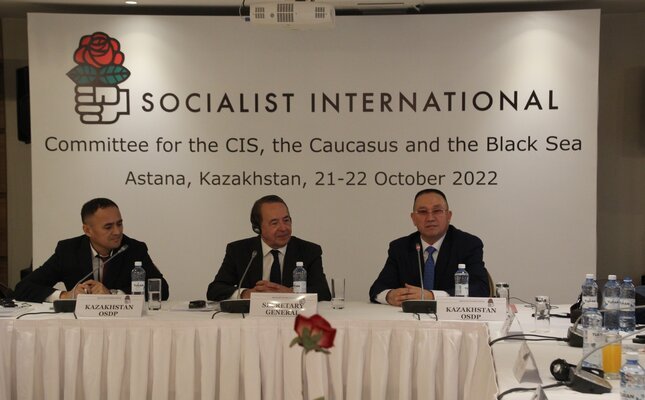The SI Committee for the Caucasus and Black Sea region met in Astana on 21-22 October 2022, hosted by the Nationwide Social Democratic Party (OSDP), focusing on the key issues on the regional agenda. The meeting opened with a minute of silence in memory of Araz Alizadeh, leader of the SDPA of Azerbaijan and a co-chair of the committee, who passed away a few weeks ago.

Declaration of the Committee
Nation-wide social-democratic party Жалпыұлттық социал-демократиялық партия
010000, Shevchenko str., 10/1, of. 203, Astana city, Kazakhstan, e-mail: osdp.center@gmail.ru
October 22, 2022
Socialist International
Secretariat
The Committee of the CIS countries, the Caucasus and the Black Sea on October 21-22 in Astana considered the geopolitical and civilizational situation in the region and in the world, adopted the Resolution, and also stated:
- The countries of the region found themselves at the epicenter of the most powerful military, geopolitical and civilizational confrontation since the Second World War. Not only all countries of the region are involved in this confrontation, but also countries located far beyond its borders, often against their will. The results of this confrontation will affect not only the future of the region, but also the future of the entire world.
- The world system has begun a transition comparable to the historical turning point in 1991, and now the collapse of the neoliberal system will have no less devastating consequences than the collapse of the communist system in 1991.
- This turning point is very important for world social democracy. On the one hand, new opportunities are opening up, on the other hand, we face new threats, and the Socialist International must be ready for them.
- The Committee made a unanimous decision that Luis Ayala would be a guarantor of stability and the successful overcoming of crises by the Socialist International and unanimously nominated him for Secretary General of the Socialist International for the next period. Also, the Committee hopes that Pedro Sánchez will be able to open up new opportunities and supported his candidacy for the post of President of the SI.
Since its Co-chairmen were absent from the Committee meeting due to the fact that one died and the other is in prison, on behalf of all Committee members who took part in the meeting on October 21-22 in Astana:
- Armenia – Dashnaktyutyun
- Azerbaijan – SDPA
- Belarus - SDPB Narodnaya Hramada
- Kazakhstan – OSDP
- Kyrgyzstan – SDK
- Ukraine – SDPU
Chairman of the host party OSDP
Askhat Rahimzhanov
RESOLUTION
Our region has found itself at the epicentre of the most powerful military, geopolitical and civilisational confrontation since the Second World War, the war waged by the Russian Federation against Ukraine. This conflict has drawn in all the countries of the region, as well as those far beyond its borders, often against their will, and it is clear that the result of this war will affect the future of both the region and the entire world.
The war against Ukraine has already acquired the characteristics of genocide. This has included attacks on critical social infrastructure, attacks and bombings of the civilian population, execution of civilians in the occupied territories, torture, ethnic cleansing, sexual and physical violence against civilians and military personnel of all genders and ages, including children under 4 years of age.
All of this is accompanied by threats to use nuclear weapons against a country that voluntarily refused them, and provocative actions at the Zaporizhzhia nuclear power plant and the Kakhovka hydroelectric power station that could bring about an ecological catastrophe on a global scale. All these crimes must be investigated by a special international tribunal, and all the guilty parties, including those who masterminded, ordered and executed these violations, must be held accountable.
Russia's war against Ukraine is primarily a war of despotism against democratic values and principles. This illegal and unprovoked invasion has seen all true democracies unite in support of Ukraine’s freedom. The SI reiterates its full solidarity with the struggle of the Ukrainian people and calls for the withdrawal of Russian military forces from all Ukrainian territory, respecting the borders of 1991.
The use of suicide drones by Russia in Ukraine against non-military facilities, targeting civilians and social infrastructure is a deeply troubling development and a further violation of international law. The committee appeals to the government of Tajikistan not to allow the construction of plants for the production of Iranian drones, and calls for sanctions against the authoritarian regime in Iran that supplies Russia with these weapons that are used to kill civilians in Ukraine. The committee expresses its full support and solidarity for those demonstrating for democracy and gender equality in Iran.
The committee is in full solidarity with the people of Belarus, who have declared their desire for freedom and democracy and rejected the dictatorial regime of Alexander Lukashenko. It demands the full and unconditional release of Mikalai Stakevich, members of Narodnaya Hramada and all political prisoners. Their fate cannot be subject to bargaining.
Lukashenko is an accomplice of the terrorist regime of Vladimir Putin in Ukraine and cannot represent the will of the Belarusian people. The authoritarian regime is not a guarantor of the independence of Belarus but rather a threat to its sovereignty, and Lukashenko’s actions have placed Belarus under de facto occupation. Any negotiations with the regime must result in the release of political prisoners, the withdrawal of Russian troops and the transfer of power to bring an end to the dictatorship.
The committee takes into account the report of the Social Democrats of Kyrgyzstan (SDK) on human rights violations and the restriction of freedom of speech in Krgyzstan. It calls on the authorities of that country to release Almazbek Atambaev, Kanykey Aranova, Adilet Baltabay, Yrys Zhekshenaliev and Ruslan Beknazarov, as well as to stop the pressure and unfair trials against political prisoners in the case of the Koi-Tash events, as well as the persecution of Aizhan Myrsaliyeva. It further calls on the authorities of Kyrgyzstan to investigate the provocations against Azattyk, Cactus Media and Kloop.
The committee has heard the special report of the SDK and condemns the military aggression by Tajikistan against Kyrgyzstan. It reiterates the position of the SI that a durable resolution to the question of the border between Kyrgyzstan and Tajikistan is required, and that the only way to resolve this border dispute is through diplomacy.
In relation to the conflict between Armenia and Azerbaijan, the committee underlines the necessity of a stable peace and a permanent end to hostilities. Our organisation has always stated that peace is a prerequisite for a prosperous society which can guarantee the democratic rights and well-being of its citizens. The armed conflict in autumn 2020 was a tragic reminder that there is no military solution to this dispute, with war bringing only greater suffering, more loss of life and further escalation of violence. Adherence to the terms of the 2020 ceasefire agreement is of utmost importance. The Socialist International will continue to be committed to a peaceful path, urging the international community at large to play their part in bringing peace and security to the region.
The remaining questions regarding competing territorial claims must be addressed without further escalation of violence or the threat of force, which do nothing to address the root causes of the conflict. A comprehensive and durable peace agreement is dependent on mutual recognition of internationally recognised borders, the absence of territorial claims and respect for the fundamental rights of the citizens of both states. The parties must commit to refrain from undermining the security of each other, by threats or the use of force in a manner inconsistent with the terms of the UN Charter. Recent military operations and strikes on settlements and civilian infrastructure are not conducive to peace between the countries. The SI calls on both sides to ensure that their troops are withdrawn from the territory of the other country. Any third-party involvement in the military confrontation is condemnable and must be stopped.
Both governments must abide by international law at all times and the SI condemns torture wherever and whenever it occurs. The committee calls for the return of prisoners of war and detainees as an important step towards peace. The committee expresses its hope that delimitation and demarcation of the border between Armenia and Azerbaijan can lead to the establishment of diplomatic relations between the countries, and the unblocking of transport and other communications. In a state of peace, the possibility also exists for cooperation in fields of mutual interest.
The committee resolves to develop contacts with like-minded socialist and social democratic parties in the region from countries that are not yet represented within the SI.
It will broaden the scope of its future activities, including the organisation and holding of joint events within the framework of the committee to increase visibility and reach in the countries of the region. This could take the form of common forums with youth and women’s wings of member parties or the participation of government agencies and experts who share our ambition of advancing and popularising social democracy.
The committee will continue to be a platform for the development of inter-party relations and exchange of experience in party building. Future activities should include the organisation of practical seminars to share the expertise held within the committee, and initiatives with other continents to build on the successes of SI member parties in other regions of the world.
Committee members will remain engaged with efforts to peacefully resolve conflict situations in countries of the region.
__________________

